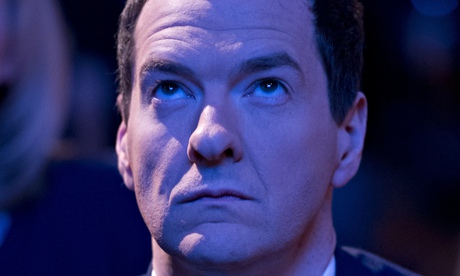The demands of business dominate our politicians and embed inequality. It’s a full-blown assault on democracy

The more power you possess, the more insecure you feel. The paranoia of power drives people towards absolutism. But it doesn’t work. Far from curing them of the conviction that they are threatened and beleaguered, greater control breeds greater paranoia.
On Friday, the chancellor of the exchequer, George Osborne, claimed that business is under political attack on a scale it has not faced since the fall of the Berlin Wall. He was speaking at the Institute of Directors, where he was introduced with the claim that “we are in a generational struggle to defend the principles of the free market against people who want to undermine it or strip it away”. A few days before, while introducing Osborne at the Conservative party conference, Digby Jones, former head of the Confederation of British Industry, warned that companies are at risk of being killed by “regulation from ‘big government’” and of drowning “in the mire of anti-business mood music encouraged by vote-seekers”. Where is that government and who are these vote-seekers? They are a figment of his imagination.
Where, with the exception of the Greens and Plaid Cymru – who have four MPs between them – are the political parties calling for greater restraints on corporate power? When David Cameron boasts that he is “rolling out the red carpet” for multinational corporations, “cutting their red tape, cutting their taxes”, promising always to set “the most competitive corporate taxes in the G20: lower than Germany, lower than Japan, lower than the United States”, all Labour can say is “us too”.
Its shadow business secretary, Chuka Umunna, once a fierce campaigner against tax avoidance, accepted a donation by a company which delivers “tailored tax solutions to individuals and organisations internationally”. The shadow chancellor, Ed Balls, cannot open his lips without clamping them around the big business boot. There’s no better illustration of the cross-party corporate consensus than the platform the Tories gave to Jones to voice his paranoia. Jones was ennobled by Tony Blair and appointed as a minister in the Labour government. Now he rolls up at the Conservative conference to applaud Osborne as the man who “did what was right for our country. A personal pat on the back for that.” A pat on the head would have been more appropriate – you can see which way power flows.
The corporate consensus is enforced not only by the lack of political choice, but by an assault on democracy itself. Steered by business lobbyists, the EU and the US are negotiating a Transatlantic Trade and Investment Partnership. This would suppress the ability of governments to put public interest ahead of profit. It could expose Britain to cases like El Salvador’s, where an Australian company is suing the government before a closed tribunal of corporate lawyers for $300m (nearly half the country’s annual budget) in potential profits foregone. Why? Because El Salvador refused permission for a gold mine that would poison people’s drinking water.
Last month the Commons public accounts committee found that the British government has inserted a remarkable clause into contracts with the companies to whom it is handing the probation service (one of the maddest privatisations of all). If a future government seeks to cancel these contracts (Labour has said it will) it would have to pay the companies the money they would otherwise have made over the next 10 years. Yes, 10 years. The penalty would amount to between £300m and £400m.
Windfalls like this are everywhere: think of the billion pounds the government threw into the air when it sold Royal Mail, or the massive state subsidies quietly being channelled to the private train companies. When Cameron told the Conservative party conference “there’s no reward without effort; no wealth without work; no success without sacrifice”, he was talking cobblers. Thanks to his policies, shareholders and corporate executives become stupendously rich by sitting in the current with their mouths open.
Ours is a toll-booth economy, unchallenged by any major party, in which companies which have captured essential public services – water, energy, trains – charge extraordinary fees we have no choice but to pay. If there is a “generational struggle to defend the principles of the free market”, it’s a struggle against the corporations, which have replaced the market with a state-endorsed oligarchy.
It’s because of the power of corporations that the minimum wage remains so low, while executives cream off millions. It’s because of this power that most people in poverty are in work, and the state must pay billions to supplement their appalling wages. It’s because of this power that, in the midst of a crisis so severe that the world has lost over 50% of its vertebrate wildlife in just 40 years, the government is organising a bonfire of environmental protection. It’s because of this power that instead of innovative taxation (such as a financial transactions tax and land value taxation) we have permanent austerity for the poor. It’s because of this power that billions are still pumped into tax havens. It’s because of this power that Britain is becoming a tax haven in its own right.
And still they want more. Through a lobbying industry and a political funding system, successive governments have failed to reform, corporations select and buy and bully the political class to prevent effective challenge to their hegemony. Any politician brave enough to stand up to them is relentlessly hounded by the corporate media. Corporations are the enemy within.
So it’s depressing to see charities falling over themselves to assure Osborne that they are not, as he alleged last week, putting the counter view to the “business argument”.“We don’t recognise the divide he draws between the concerns of businesses and charities,” says Oxfam. People “should be celebrating not denigrating the relationship between business and charities”, says the National Council for Voluntary Organisations. These are good groups, doing good work. But if, in the face of a full-spectrum assault by corporate power on everything they exist to defend, they cannot stand up and name the problem, you have to wonder what they are for.
There’s a generational struggle taking place all right: a struggle over what remains of our democracy. It’s time we joined it.



